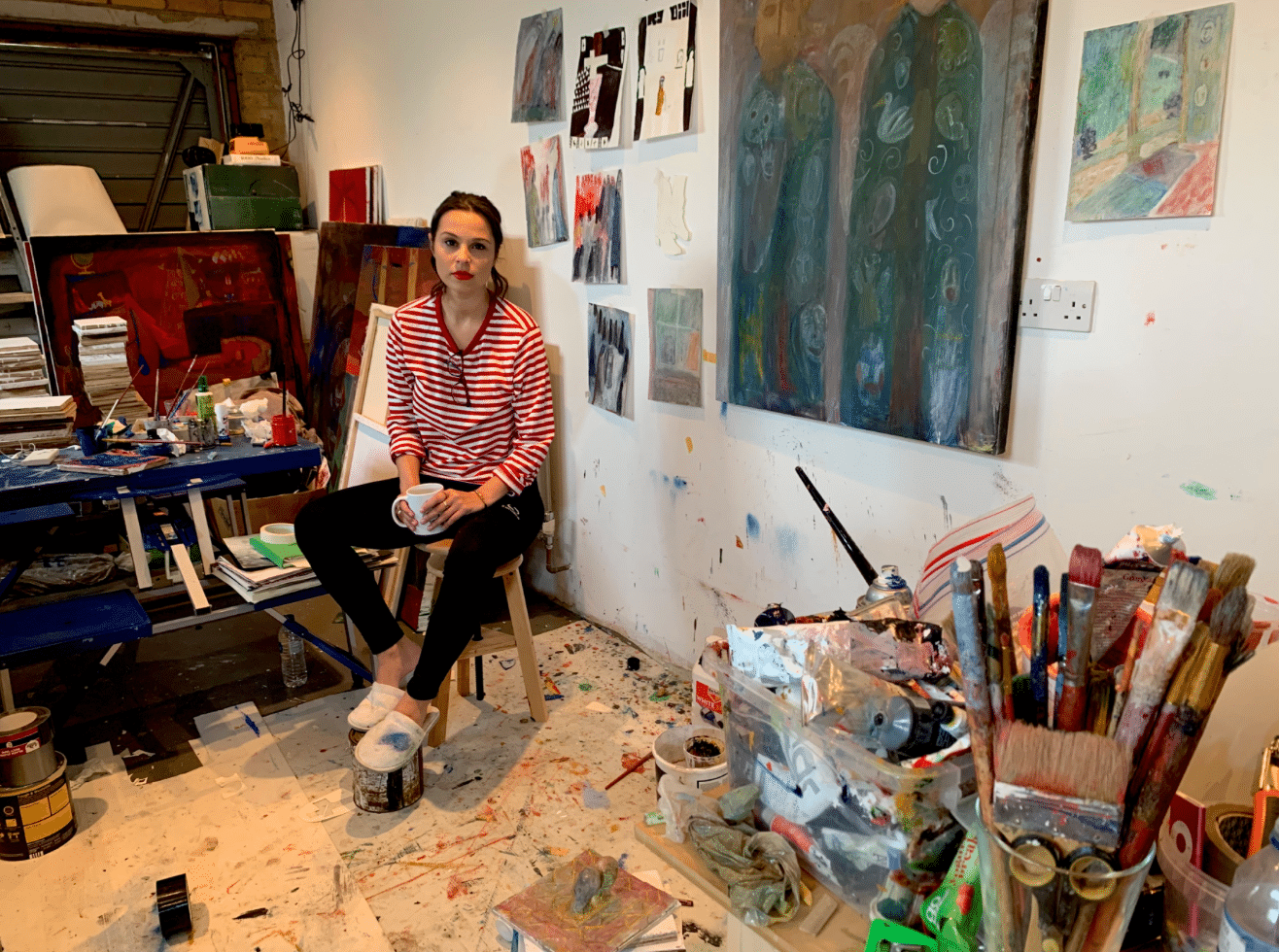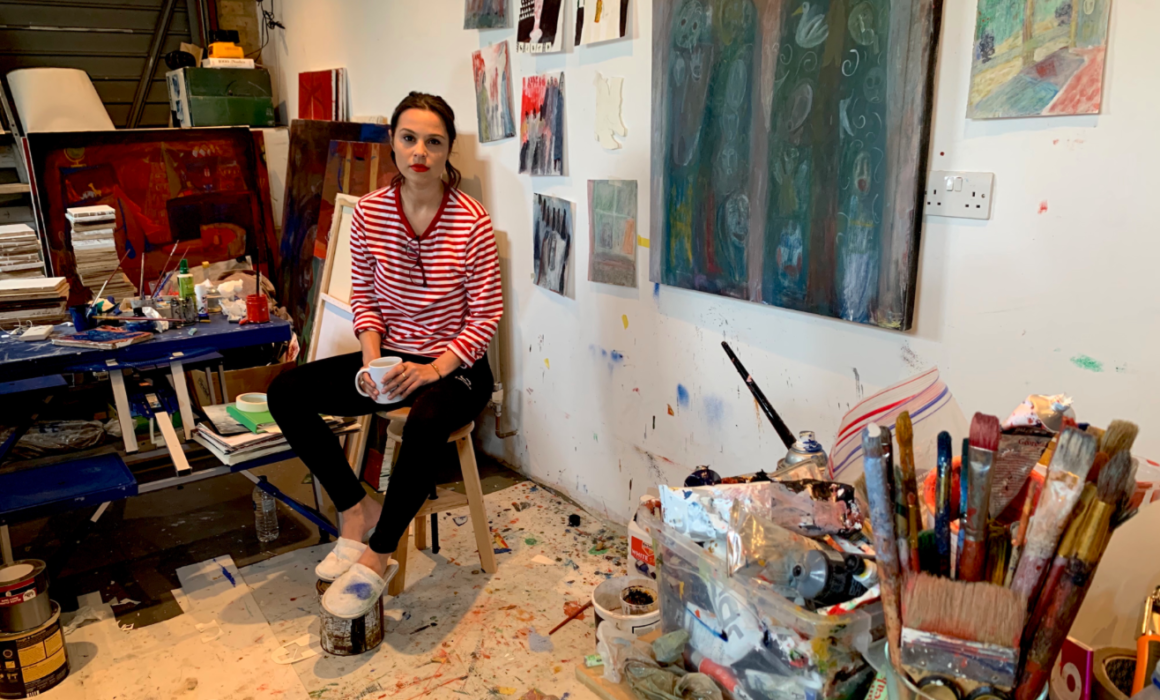Lucia Ferrari in Conversation with Sarah Forman

The #LockdownEditions are a Delphian-run initiative to support some of our favourite contemporary artists during these difficult and unprecedented times. Throughout the remainder of the quarantine measures, we will be releasing a new print each week, with all of the profits going directly to the artists themselves. This week, we’re excited to feature our fourth artist, Lucia Ferrari, to talk about pay raises for the NHS and Andy Warhol coming back from the dead.
Sarah Forman: Tell us a bit about yourself and your practice.
Lucia Ferrari: I’m a London based artist and hold a degree from The Slade School of Fine Art at UCL. My work has taken a huge turn given the current climate and being in isolation. It’s forced me to really push boundaries and explore materials I would have previously never thought of using. I’m heavily influenced by my Italian heritage and after living in Venice have since become obsessed with 15th century frescos, like the ones in San Marco. Narrative is the driving force behind my work and often guides where my paintings go. I lay paint onto a surface, see images appear and from these I start filling in what may be a face, a hand, and build the narrative out of that subject. I think my subconscious plays a vital part in that, perhaps.
SF: Where are you based and how has the current global health crisis affected your day-to-day?
LF: I’m based in North London, literally just on the belt. In terms of the pandemic I’m not working my nine to five. Instead I’ve been lucky enough to dedicate all this time to working in ‘my home studio’. A few months back I cleared out half of the garage…maybe I saw this coming.
SF: In what ways have you changed how you work and/or what you’re working on?
LF: I think what has changed the most is actually having the time to dedicate myself solely to my practice. It’s proved to me when you can give every day to painting, drawing, you can really improve a lot and consolidate what’s successful or not, learn quickly from what you’ve done. Aside from time, I’ve developed a ‘take risks’ attitude -nobody is really going to see if a painting I do completely falls flat, so I just throw myself into it. I’ve treated this time as if I was on a residency, just in my own house.
SF: How have you seen your community affected by the current COVID-19 crisis? Inside and outside the art world?
LF: The artistic community has done incredibly well to support one another. I’ve been involved in other group shows that have been setup for the same purpose as Delphian’s initiative. Ultimately everyone is being affected by this crisis, whether it’s being away from loved ones or being away from work, among many other things. It has completely altered our current lifestyle. I just hope after all of this people continue to be selfless. And that NHS workers get a pay raise.
SF: Can you talk to us a little bit about this print and why you chose it?
LF: Narrative is really important to my work and while making the original drawing I was thinking about how our freedom has been stripped away from us, despite it being for the right reasons – protecting our loved ones, our supports. I realised I’d taken for granted how easy it was to see my partner, family and friends. I was also thinking of our liberty more in a dystopian setting, than directly drawing our current crisis. It’s just relevant.
SF: Do you feel there’s a certain pressure to respond to what’s going on in the world right now? If so, what does that look like?
LF: I think by default if you’re making work now it becomes work you’ve made through isolation, whether you are directly responding to the pandemic or using materials that are readily available to you as a result of having limited resources. The other day I ran out of canvas but I had a full sheet of ply wood, so I’ve just cut that up instead, using oil undercoat that was lying around – and had slightly gone off – to seal the wood. I would never have used this as a surface if we weren’t in these circumstances, but I have to say, it’s great.
SF: Have you seen initiatives taking place that really scare you? Excite you?
LF: It’s not an initiative per se but I did spend a couple of hours the other day going through The National Gallery and Tate virtually. Online exhibitions have provided a really good platform particularly for emerging artists, and the artist support pledge was a little bit of genius, really. I also signed me and my mum up for a MOMA course. After having her run into my room the other day, telling me Andy Warhol was on “This Morning with Holly and Phil”, I figured it was time to intervene…the courses are free and they give you something to do. Yale and Cambridge also have some online free courses as well.

